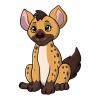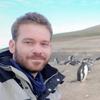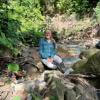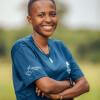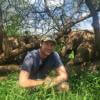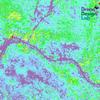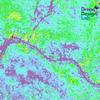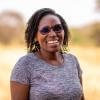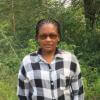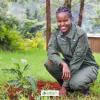Human-wildlife conflict and coexistence is a shockingly common problem, often with enormous consequences for both individual animals and entire populations.
When human-wildlife conflict comes to mind, you may immediately think of wildlife crime instead - which isn't wrong, since many regions with wildlife crime problems like poaching are also areas where people may frequently deal with human-wildlife conflict, causing the two issues to go hand-in-hand. But human-wildlife conflict is a much broader issue encompassing many ways that human presence and interference can cause problems for us and animals alike. Human-wildlife conflict includes:
- Elephants trampling a farmer's crops, resulting in retaliation
- New real estate developments infringing on ecosystems where predator species live, leading to predators having less territory and less food, which in turn leads to predators attacking domestic animals and livestock
- Freeways dividing the territory of animals like mountain lions, leading to wildlife venturing into neighborhoods or being killed by cars
- Lead bullets used in hunting causing scavengers like condors to die of lead poisoning
These are just a few examples of how humans can negatively impact wildlife, and it's clear to see how many of these scenarios could escalate. Human-wildlife conflict solutions don't just include ways in which we can prevent these issues (for example, through tracking predators, monitoring populations' territories, or building barriers and wildlife crossings monitored by sensors), but also the ways in which we can help people connect with wildlife and care about learning to live alongside them.
If you're interested in solutions that can prevent human-wildlife conflict, join this group and get to know the people who are working to protect and save species around the world!
Header image: Casey Allen on Unsplash
No showcases have been added to this group yet.
- @msgunther1
- | she, her
Micaela Szykman Gunther is a Professor in the Department of Wildlife at Cal Poly Humboldt. She applies studies on animal behavior of (mostly) carnivores and (some) ungulates to inform management of wildlife species.
- 0 Resources
- 0 Discussions
- 4 Groups
- @Mohamud
- | He/Him
A passionate Conservationist. Director and Founder to Isiolo County Conservancies Association
- 0 Resources
- 0 Discussions
- 2 Groups
- @Gody
- | He
Godfrey Nyangaresi, a dedicated Protection Manager with 12+ years of wildlife conservation experience. Skilled in technologies, administration, and law enforcement, he leads protection efforts at STEP, ensuring the sustainable conservation of elephants in southern Tanzania.
- 0 Resources
- 3 Discussions
- 17 Groups
- @GalZanir
- | he, him
Luc Hoffman Institute
Wildlife Entrepreneur | Innovation for Nature Conservation | Systems-thinking | Web3.0 | Artificial Intelligence | Agency for nature | DAOs | Rewilding & more
- 1 Resources
- 0 Discussions
- 8 Groups
Wildlife Ecologist
- 0 Resources
- 0 Discussions
- 9 Groups
- @Jackeline
- | She
- 0 Resources
- 0 Discussions
- 7 Groups
- @RHugtenburg
- | He/They
Student at Aberystwyth University. Bug Fanatic🪲. Worked at Octophin Digital for my industrial year placement 🐙.
- 0 Resources
- 0 Discussions
- 19 Groups
Working for India's Forestry and Biodiversity Sector as a country officer of Japan International Cooperation Agency (JICA)
- 2 Resources
- 0 Discussions
- 1 Groups
- @mbkowalski11
- | he/him
University of California Santa Cruz
PhD Student (UCSC, Wilmers Lab) interested in large carnivores, behavioral ecology, human-wildlife coexistence, and biologging
- 0 Resources
- 3 Discussions
- 11 Groups
- @kadambarid
- | she, her, hers
Dr. Kadambari Devarajan is an engineer-turned-ecologist working on biodiversity monitoring. (Website - http://kadambarid.in/)
- 0 Resources
- 0 Discussions
- 14 Groups
Early career, assistance in biologging projects with owls and eagles
- 0 Resources
- 0 Discussions
- 5 Groups
- 2 Resources
- 0 Discussions
- 8 Groups
Making waves in wetland conservation: Explore the outcomes and insights from Ramsar COP15, a premier global event on wetland protection and sustainability
10 August 2025
Calling conservation organizations working to protect the Asian elephant, apply now for a chance to receive a grant of up to $ 5,000. Proposals are accepted year-round.Photo by Hu Chen on Unsplash.
4 July 2025
This is a chance to participate in a short survey about the preferences that conservation practitioners have for evidence. There's a chance to win one of three £20 Mastercard gift cards.
24 June 2025
A Post-Doc position is available to join the team coordinating the Urban Exploration Project – a collaborative initiative in partnership between the University of St. Andrews and the National Geographic Society.
2 May 2025
This project aimed to reduce human-carnivore conflict by building a resilient boma for a vulnerable family in Hunyari village. It served as a model for other families, promoting stronger livestock protection. The...
17 April 2025
WWF's Arctic Community Wildlife Grants program supports conservation, stewardship, and research initiatives that focus on coastal Arctic ecology, community sustainability, and priority Arctic wildlife, including polar...
7 March 2025
The worst thing a new conservation technology can do is become another maintenance burden on already stretched field teams. This meant Instant Detect 2.0 had to work perfectly from day 1. In this update, Sam Seccombe...
28 January 2025
The Zoological Society of London's Instant Detect 2.0 is the world's first affordable satellite connected camera trap system designed by conservationists, for conservationists. In this update, Sam Seccombe describes the...
21 January 2025
Wildlife on roads creates a significant hazard in rural areas, to humans and animals alike. Low-tech prevention methods such as overpasses give great results, but they are expensive and can’t cover every scenario. Now...
12 November 2024
Very nice video!
7 October 2024
The Connected Conservation is thrilled to announce our award's third round in collaboration with the Airbus Foundation. This award champions the use of cutting-edge satellite imagery to tackle biodiversity loss and...
30 September 2024
The Human-Wildlife Initiative operates in three areas, viz. France's Provence-Alpes-Côte d’Azur ( PACA ) region, French-speaking Switzerland and Spain. Each has it's own call with it's own specifics.
11 September 2024
October 2025
event
November 2023
September 2023
event
July 2023
event
32 Products
3 R&D Projects
42 Organisations
Recently updated products
Recently updated R&D Projects
Recently updated organisations
| Description | Activity | Replies | Groups | Updated |
|---|---|---|---|---|
| I did a short presentation on our work with the polar bear alarm in the Wildlabs Variety Hour October 30th.It can be found here : https://www.youtube.com/watch?v=zr2Q8bUJZ8U... |
|
Human-Wildlife Coexistence, AI for Conservation | 9 months 3 weeks ago | |
| Thanks, we know they are breeding these animals here, I asked, since it's seems to be an expensive hobby, we need to allocate more funding for rural women in entrepreneurship and... |
|
Acoustics, Animal Movement, Citizen Science, Human-Wildlife Coexistence, Protected Area Management Tools, Wildlife Crime | 9 months 4 weeks ago | |
| 180m is indeed very high and from above. I think a 640x512 thermal sensor with a 70mm lens can see animals at at 180m from sideways and could recognise something as a deer, but... |
+11
|
Drones, Human-Wildlife Coexistence | 10 months ago | |
| I would love to see my bat detector designs in use in Africa - drop me a line, let's see if we can get something to happen - I'm pipistrelledetector at gmail dot comhttp://www.... |
|
Citizen Science, Acoustics, Conservation Tech Training and Education, Human-Wildlife Coexistence | 10 months 1 week ago | |
| Odor based methods would be interesting. Provided they didn't need to be replenished too often.We find varied stimulus prevents habituation. |
+6
|
AI for Conservation, Conservation Tech Training and Education, Emerging Tech, Human-Wildlife Coexistence | 10 months 2 weeks ago | |
| Dear Alex Rood,Thank you so much for the advice. I’ll make sure to regularly check the career openings on resources page. I appreciate your support. |
|
East Africa Community, Community Base, Early Career, Human-Wildlife Coexistence | 11 months 1 week ago | |
| Thank you so much! Now everything is in the hands of amazing organizations and companies! But the first results of the Disaster Management cohort are bringing a very optimistic... |
|
AI for Conservation, Climate Change, Early Career, East Africa Community, eDNA & Genomics, Emerging Tech, Ending Wildlife Trafficking Online, Human-Wildlife Coexistence, Open Source Solutions | 1 year ago | |
| @cmwainaina please take a look |
|
Animal Movement, AI for Conservation, Camera Traps, Connectivity, Data management and processing tools, East Africa Community, Emerging Tech, Ethics of Conservation Tech, Human-Wildlife Coexistence, Marine Conservation, Protected Area Management Tools, Geospatial, Sensors, Software Development | 1 year ago | |
| Hi @nyangetamagesa , i'm so grateful for our input. |
|
Human-Wildlife Coexistence, Data management and processing tools, East Africa Community, Women in Conservation Tech Programme (WiCT) | 1 year ago | |
| Thank you so much Adventina for sharing this wonderfully knowledge with me. |
|
Human-Wildlife Coexistence | 1 year 1 month ago | |
| I will start by asking: What will the future of conservation be if all the incentives do not hit the jackpot????In recent years, we have... |
|
Conservation Tech Training and Education, East Africa Community, Human-Wildlife Coexistence | 1 year 1 month ago | |
| In that case, you might want to keep an eye on the project from @Lars_Holst_Hansen |
|
Camera Traps, AI for Conservation, Conservation Tech Training and Education, Early Career, Human-Wildlife Coexistence, Protected Area Management Tools | 1 year 2 months ago |

